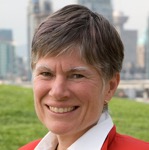 Ellen Woodsworth is Chairperson of Women Transforming Cities International (WTC), an NGO working to change cities for women and girls, through community engagement, inclusive policies and equitable representation.
Ellen Woodsworth is Chairperson of Women Transforming Cities International (WTC), an NGO working to change cities for women and girls, through community engagement, inclusive policies and equitable representation.
She is a former Vancouver City Councillor and an international speaker who uses an intersectional lens on urban issues in order to ensure full citizen engagement in identifying and creating solutions. WTC partnered with Canadian cities & NGO’s to produce “Advancing Equity and Inclusion a Guide for Municipalities” accepted as a UN Habitat 3 Urban Solution. See: www.womentransformingcities.org.
She spoke at the UN International Women Friendly Cities Conference in Turkey, on Social Cohesion at the UN Habitat 3 Prague EU/North American Regional Conference and was a participant in the UN Office of High Commissioner of Human Rights Expert Group Meeting: Human rights and the New Urban Agenda. WTC has identified 11 key issues to make cities work for women and girls which she thinks will be key to achieving Vancouver’s goal to be the greenest city in the world by 2020.
Presentation abstract:
"The City We Need" to quote the World Urban Campaign of UN Habitat 3, is a city that is socially, environmentally and economic sustainable. All of these factors work together to enable people and the planet to live in ways that will as indigenous people say give the next seven generations a good future. Over 70 % of the worlds people will live in cities by 2050 and 60 % of the infrastructure has yet to be built. This gives us a great opportunity to use an intersectional lens on urban policies, programmes, budgets and governance to create cities that work for everyone. Right now most cities and environmental movements do not include the people who are most impacted by the pressing crisis of climate change, economic disparities and lack of affordable housing and transit, in the discussion of the problem in order to come up with solutions that work for their lives. For instance if the emergency preparedness strategy used in Fukushima, Japan had an intersectional lens to look at the diversity of their population in preparing for a possible nuclear melt down and tsunami they would have know that women were working in the home caring for children and elders. Because they didn't look at the multiplicity of women's lives doing both paid and unpaid work many of the housewives died because they were invisible. Housewives who refused to do the recycling who said they didn't want to do anymore unpaid work also in Japan stopped the environmental movement. We have to include all people as we plan our green futures or our strategies will not work. That is what an intersectional lens with disaggregate data can help us do.